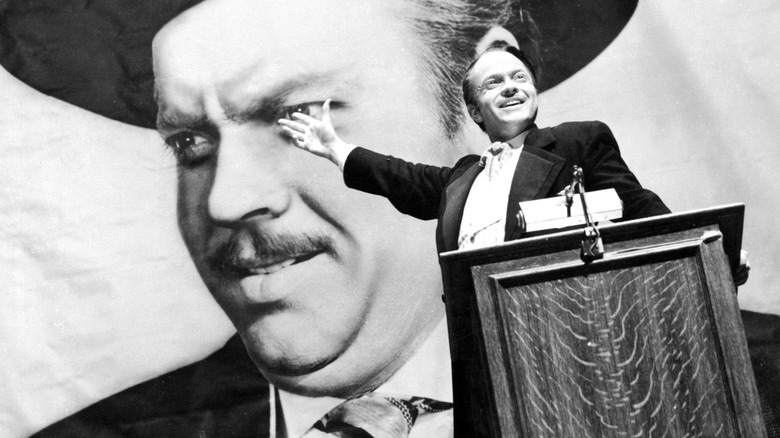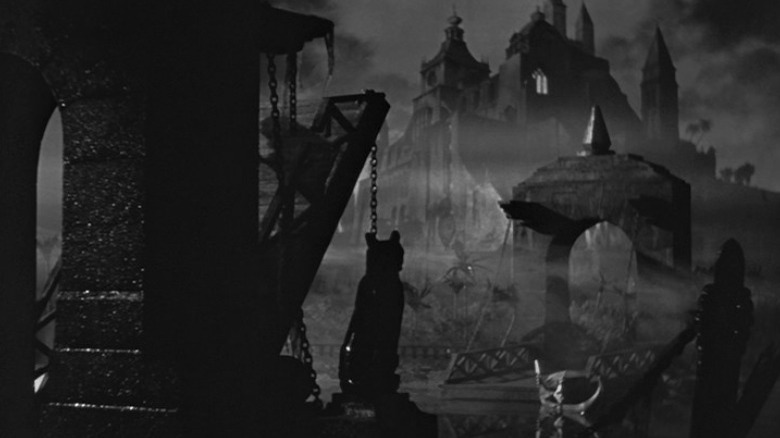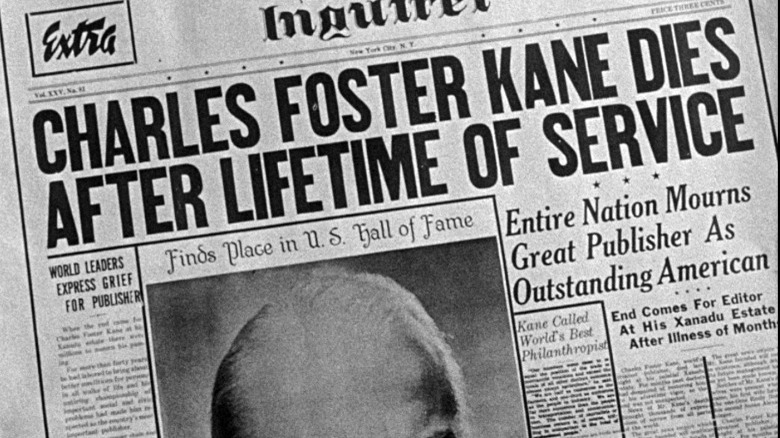The Behind-The-Scenes Drama That Almost Kept Citizen Kane From Theaters
If there's one thing I love more than a man who builds his career on very public melodrama, it's two men who build their careers on very public melodrama. For this reason, the ever-evolving lore around the making of "Citizen Kane" will always be like catnip to me. If you're reading this, you probably know that Orson Welles' 1941 drama "Citizen Kane" is widely considered one of the best films in cinematic history, despite recently losing its perfect Rotten Tomatoes score. But did you know the man "Kane" is based on, William Randolph Hearst, went to great and scandalous lengths to try to destroy Welles' reputation?
Welles Had A Powerful Enemy
In his 2016 book "Citizen Kane: A Filmmaker's Journey," author Harlan Lebo dug deep into the archives to uncover evidence of Hearst's plot against Welles. Hearst, a media magnate who set a new standard for media sensationalism, bears more than a passing resemblance to "Citizen Kane" subject Charles Foster Kane (Welles). In the film, Kane retreats to his grand estate, Xanadu, while the real-life Hearst owned California's Hearst Castle, along with other luxury properties.
According to The Guardian's reporting on Lebo's book, Welles' lawyer and manager, Arnold Weissberger, advised him to never admit to the similarities between the two figures. ""It is essential that we maintain consistently, emphatically and unequivocally that Hearst has nothing to do with this picture," he reportedly said.
The details of Hearst's campaign against Welles weren't always publicly known, but Lebo's research discovered documents that lent film historians a deeper understanding of what exactly happened. Lebo told The Guardian that, despite there not being evidence that Welles was a Communist, his political leanings were Hearst's main target. "It was a Communist witch-hunt that was planned and managed at the top level of the Hearst organization," Lebo said. At the time, "Communist" was a common and effective label to throw at one's enemies.
Hearst Used His Newspapers Against Kane
Furthermore, The Guardian seems to imply that some people even thought Hearst's lackeys were capable of criminally framing the director. "Don't go back to your hotel. They've got a 14-year-old girl in the closet and two photographers waiting for you to come in," a police investigator apparently told Welles during a lecture tour. It's unclear exactly what the officer meant, or whether this was true, but it sounds like a set-up that would lead down the path of dangerous misinformation Hearst was known for.
While Hearst clearly had problems with "Citizen Kane," Welles himself thought his lackeys were probably behind the campaign, rather than the man himself. Per research reported by The Guardian, Welles said that Hearsts' underlings probably took on the task "to show the boss that they were on the ball." I wish I could say a story like this seems rare, but Hearst's level of corruption pretty much seems like par for the course for the extremely wealthy and influential among us.
It's a testament to Welles' boldness that "Citizen Kane" not only made it to a wide audience, but became one of the most-loved movies of all time. Hearst was one of the nation's most powerful people in 1941, but despite going so far as to ban mentions of the movie from his 26 newspapers, 11 radio stations, and 16 magazines, "Citizen Kane" still persevered. If his rampage hadn't been so public, would people today still associate Kane so directly with Hearst, or would the link be less obvious if the media mogul hadn't made history by waging war with the director? I'm not sure, but I know that even in 2021, saying the newspaperman's name will surely call to mind the hateful tyrant at the center of Welles' best work. More ironic still, it makes myself (and likely many others) think about the character's miserable final moments. I think Hearst's plan may have backfired.


